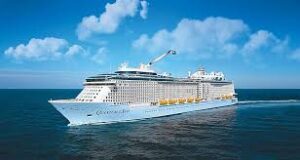5 things cruise lines can teach the hospitality industry
 Not every hotel can rely on cruise ship basics to boost their customers’ experiences. However, there’s definitely something to improve at every hotel – what can you do better? Perhaps studying a cruise ship can help you.
Not every hotel can rely on cruise ship basics to boost their customers’ experiences. However, there’s definitely something to improve at every hotel – what can you do better? Perhaps studying a cruise ship can help you.
It’s true — a cruise ship is much different than a hotel. The former carries passengers from port to port, feeding and entertaining them along the way. Alternatively, hotels provide a place to sleep and, often, not much more than that.
With that in mind, hotels stand to gain a lot by studying how cruise lines operate. Customers come back for cruises again and again, and any hotel chain could use that kind of loyalty. So, how can you get it? Here are five things the hospitality industry can learn from cruises:
1. Build a Connection With Clients
For starters, cruise lines do an impeccable job of connecting with their passengers. People stay on board for several days or weeks at a time. During that stretch, they get to know the people caring for them — from housekeepers to bartenders to waiters to activity leaders. Bonding with cruise ship staff makes a vacation feel even more special. This connection keeps many cruisers coming back year after year.
Not every hotel has a full slate of activities through which staffers can bond with their clients. However, hotel staffers can stand to interact more with guests. Indeed, interacting with guests is a tried-and-true way to improve their overall experience. In some cases, you only have the check-in process to make such an impression. So, make the most of it by being as friendly and helpful as possible.
Beyond that, be a friendly face. Smile and wave when people re-enter the lobby and ask if you can help them. Make suggestions for activities and restaurants when asked. These conversations can make a huge impression.
2. Facilitate Experiences and Activities
Cruise ships make it their mission to pair passengers with the perfect activities to entertain them on their trips. Once on board, it’s easy for guests to figure out what’s going on and what they want to do. They can check out in-room TVs or booklets and easily sign up to participate. And, with those simple steps, they’ve guaranteed themselves an unforgettable experience.
Hotels should prepare the same slate of suggested to-dos. Of course, not all locations will attract lodgers who want to be tourists. But preparing just in case with a list of local eateries and activities will delight customers.
3. Make It Luxurious
This tip particularly derives from small cruise lines, where customers tend to be enveloped in luxurious surrounds and extras. Guests on these ships expect the best, and they get it — comfortable beds, soft linens, five-star food and access to some incredible ports.
Even a small or budget hotel can strive to meet these standards. For starters, make the sleeping space as comfortable and cozy as possible. Choose towels that feel soft and stay that way after washing and stock quality toiletries in the bathrooms. And make suggestions as to what customers can do while they’re with you. Familiarize yourself with the extras customers want, such as smartphone accessibility and local experiences. Then, make them happen.
Not every accommodation has to be a five-star hotel. But you should take steps to ensure customers feel as though they’re treated well and getting what they paid for.
4. Bundle It Up
Cruise ship passengers don’t just buy a room on board. Often, they seek out packages that make the most financial sense for their vacations. As such, they purchase plans that include their room, as well as the food they’ll eat and the drinks they’ll imbibe. Plus, cruises include port stops and on-board entertainment, much of which comes with the price. Even if the package costs a lot, it feels like a steal because it includes so much.
Hotels should try and cultivate a similar vibe. Again, not every accommodation will have extras to include in the price, but you should try and create bundles that make a stay feel like a steal. Extras such as free Wi-Fi, late check-out or a continental breakfast sweeten the deal. You can further incentivize clients by offering such bonuses through a customer loyalty program — with a set number of stays, they start receiving these prizes that make each stay seem much more valuable.
5. Stay One Step Ahead
What might your guest need or want while they stay with you? Cruise lines have more than enough extras on-board for passengers who need something. You should plan ahead for your guests’ visits, too.
So, pop a few extra towels into the closet, as well as firmer or softer pillows to boost their comfort. You might lay out a list of TV channels so they can watch what they want. Or, if a particular room tends to get too sunny for sleep in the early morning hours, provide a free sleeping mask so guests can still catch Z’s.
Some hotels do this already, especially for repeat customers. They stock the mini-fridge with their go-to snacks or set the thermostat to the person’s preferred temperature. Some of this planning requires collecting customer data — how often do they visit, how many towels do they usually need, and what’s their favorite breakfast? Storing these details and flaunting them the next time the person checks in will make a huge impression.
Back







